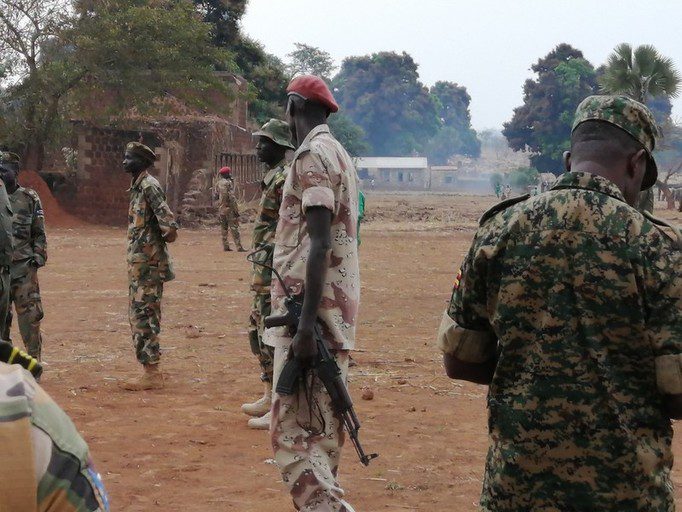If the African Union wants to silence the guns in Africa by 2020, African countries currently sitting on the UN Security Council – South Africa, Niger and Tunisia – must vote in favour of renewing the arms embargo imposed on South Sudan.
The African Union’s “Silencing the Guns” flagship project includes taking measures to prevent UN arms embargo violations. Renewing and strengthening the embargo on South Sudan is a crucial part of this effort.
The arms embargo on South Sudan should not be seen as punitive but necessary for curbing violations of human rights and international humanitarian law, improving the fragile security environment, increasing prospects of justice for victims …
The arms embargo on South Sudan should not be seen as punitive but necessary for curbing violations of human rights and international humanitarian law, improving the fragile security environment, increasing prospects of justice for victims, and facilitating socio-economic development and investment into the country’s grossly under-funded healthcare system – particularly during the COVID-19 pandemic.
Since the conflict began in December 2013, government and opposition forces alike have used a range of conventional small arms and other military equipment to commit war crimes and human rights violations and abuses, including deliberate killing of civilians, often along ethnic lines. Even people seeking refuge in hospitals and places of worship have been targeted.
Many of the cases are horrifying. In one incident in the capital Juba in December 2013, security forces rounded up nearly 300 men from the Nuer ethnic group and massacred them by gun fire. In the northeast town Malakal, fighters from the armed opposition shot dead civilians at the Malakal Teaching Hospital after capturing the town in February 2014. Two months later, about 200 people were killed in Khaly Balek mosque after opposition forces captured the northern town of Bentiu.
Since the conflict began in December 2013, government and opposition forces alike have used a range of conventional small arms and other military equipment to commit war crimes and human rights violations and abuses, including deliberate killing of civilians, often along ethnic lines.
Similarly, a group of armed youth forced their way into a UN camp in the central-eastern town of Bor, where approximately 5,000 internally displaced people were sheltering, killing about 50 of them in April 2014. In June 2016, Dinka army troops intentionally shot dead civilians mainly from the Fertit ethnic group as they ran to seek protection at the UN peacekeeping mission compound in Wau, in the west of the country. During a government offensive in southern Unity state between late April to June 2018, Amnesty International documented how civilians were run over by armoured vehicles. Between December 2018 and March 2019, government soldiers and fighters of a fringe rebel group committed extensive abuses against civilians in Yei in the south.
Many of these killings have been carried out using small arms and light weapons widely circulating in the country. Earlier this year, Amnesty International investigators visited 12 military camps and observed Eastern European Kalashnikov rifles never before documented in the country. The organization therefore believes these weapons were recently brought into South Sudan in violation of the arms embargo imposed in July 2018.
Government Mi-24 attack helicopters have also killed civilians, some as young as six years of age. On 10 July 2016, during heavy fighting between government and opposition forces, Joy Kamisa died at her grandmother’s house in Juba after she was hit in the stomach by shrapnel from a rocket fired from a helicopter gunship.
Amnesty International found that several of the Mi-24 helicopters underwent significant maintenance at Luri, a base of the National Security Service, and Juba International Airport in October 2018, and have been flown several times since. Sources told us that when the arms embargo was imposed, the country’s fleet of Mi-24 helicopters was dysfunctional and grounded. The maintenance we documented means that the government had since acquired spare parts and maintenance expertise to refurbish the helicopters, another violation of the arms embargo.
The UN arms embargo has not been a panacea to the atrocities but without it, the situation would almost certainly have been worse. The arms embargo should remain in place until the government demonstrates it is able to end grave human rights abuses and hold to account those suspected of responsibility for violations of international human rights and humanitarian law.
The UN arms embargo has not been a panacea to the atrocities but without it, the situation would almost certainly have been worse. The arms embargo should remain in place until the government demonstrates it is able to end grave human rights abuses and hold to account those suspected of responsibility for violations of international human rights and humanitarian law. The government of South Sudan has repeatedly failed in its obligation to investigate and prosecute crimes committed in relation to the conflict. In fact, it has actively obstructed attempts to secure justice for victims, including by blocking the establishment of the Hybrid Court for South Sudan that it had agreed to in the 2015 and 2018 peace agreements.
For a just and sustainable peace to endure in South Sudan, the UN Security Council must maintain the restriction on weapons entering South Sudan and improve its monitoring. When the council votes on the renewal of the arms embargo which is scheduled for the end of May, African members must be true to the spirit of silencing the guns and vote for security, development and human rights. They must vote to renew the arms embargo.
This article was first published by Jeune Afrique’s theafricareport on 30 April 2020.


